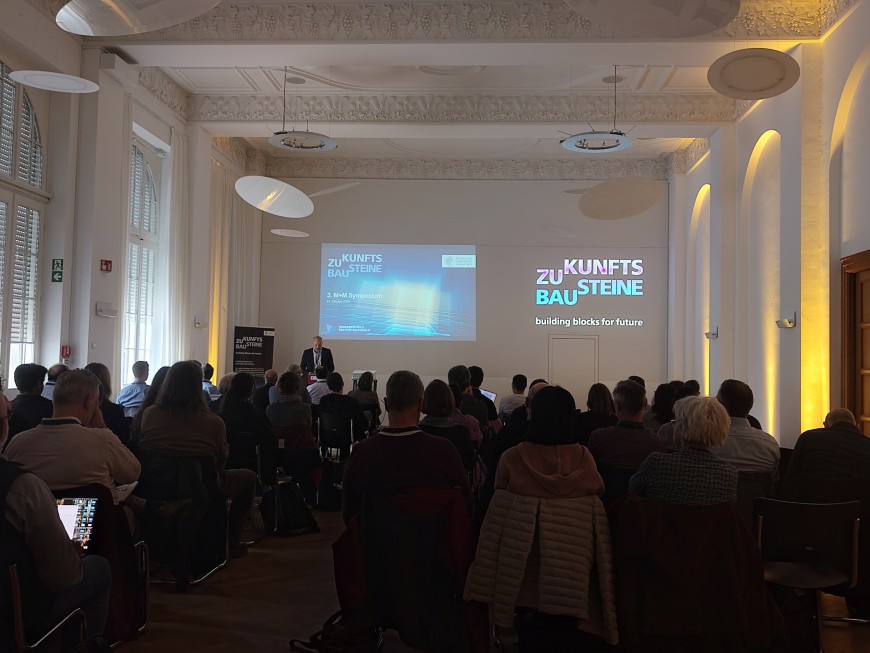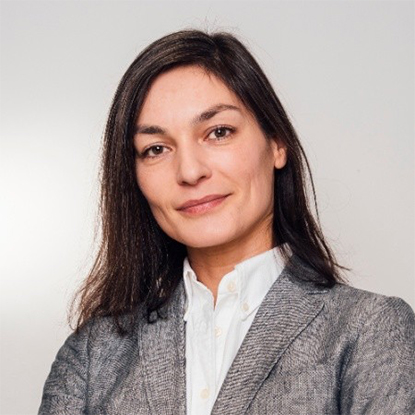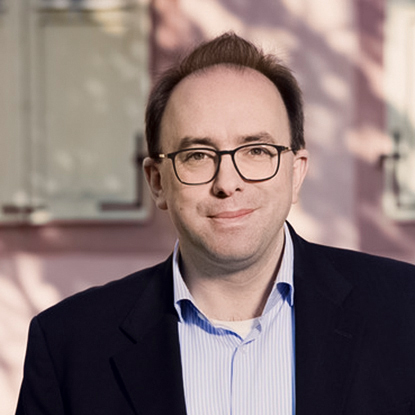3rd Symposium of the Research Field Matter and Materials
Focus on Profile Topic Synthetic Biology
2025/10/21 by MMW
Under the motto “Synthetic Biology goes …”, the Matter and Materials (M+M) Research Field at TU Darmstadt hosted its third symposium. The event, held on October 21, 2025, at the Georg-Christoph-Lichtenberg-Haus, focused on current research activities in the field of synthetic biology and its diverse application prospects – from collaborations within the Rhine-Main Universities (RMU) to robotics, nanosystems and nutrition.

On October 21, 2025, the third symposium of the Research Field Matter and Materials (M+M) took place at the Georg-Christoph-Lichtenberg-Haus at TU Darmstadt. M+M is one of the three interdisciplinary research fields at TU Darmstadt, alongside Energy and Environment (E+E) and Information and Intelligence (I+I). M+M focuses on basic research and technological development in the field of matter – from particles to materials to cells.
This year's symposium was held under the motto “Synthetic Biology goes …” and focused on current research activities in the field of synthetic biology and its diverse applications – from collaborations within the Rhine-Main Universities (RMU) to robotics, nano systems and nutrition. At the same time, the event provided a forum for exchange and new project ideas between the four profile topics of the research field: Materials Design for Sustainability and Circularity, Networks for Industry 4.0, Nuclear Science and Synthetic Biology.
In his welcoming remarks, Prof. Matthias Oechsner, Vice President for Research at TU Darmstadt, emphasized the central role of synthetic biology for interdisciplinary collaboration within the RMU. The development of biomaterials requires interdisciplinary efforts and close networking to enable innovative solutions. In this sense, synthetic biology is establishing itself as the future that will benefit and change our lives on many different levels. Prof. Achim Schwenk, spokesperson for M+M, emphasized: “Synthetic biology investigates exciting building blocks for the future of M+M, which benefit from the great synergies of the Rhine-Main universities and bring together innovative areas of the natural sciences, engineering and life sciences.”
An impressive example of an RMU collaboration was presented by Prof. Dr. Andreas Walther from Johannes Gutenberg University Mainz. In his lecture, he highlighted the development of “life-like” materials – systems that can behave adaptively, learn and interact with their environment. Such materials enable novel interactions between living and non-living matter and open perspectives for applications in medicine, robotics and lightweight construction. Walther's research combines the profile topics of Synthetic Biology and Materials Design for Sustainability and Circularity and shows how closely the disciplines are interwoven in the M+M research field.
From the Department of Biology at TU Darmstadt, Prof. Viktor Stein presented his work in the field of protein engineering, in which artificial proteins with specific properties are designed for specific purposes, including sensor and transport functions. His team uses modern synthetic biology methods to develop biological systems that can be specifically modified using high-throughput screening.
Prof. Friedrich C. Simmel from the Technical University of Munich showed how physical, biological and materials science principles interact at the interface between molecular machines and DNA nanotechnology—for example, in the development of artificial DNA switches and nanorobots.
The program was rounded off by Dr. Matthias Schmalisch, Vice President of Bio R&D at Formo Foods GmbH. The Berlin-based food tech start-up develops cheese and egg alternatives without animal products using biotechnological fermentation processes in its Frankfurt-based research laboratory. His presentation impressively demonstrated the potential of synthetic biology for sustainable nutrition concepts of the future.
In the concluding poster session, student initiatives such as iGEM, SensUs and the CompuGene Student Lab presented their current projects in the field of synthetic biology.
For TU Darmstadt, the 3rd M+M Symposium was an important catalyst for strengthening interdisciplinary cooperation and developing new research projects. The combination of scientific presentations, practical applications and intensive networking made the event a successful forum for inspiration and exchange. Looking to the future, it will be exciting to see how the ideas generated during the symposium develop further.


